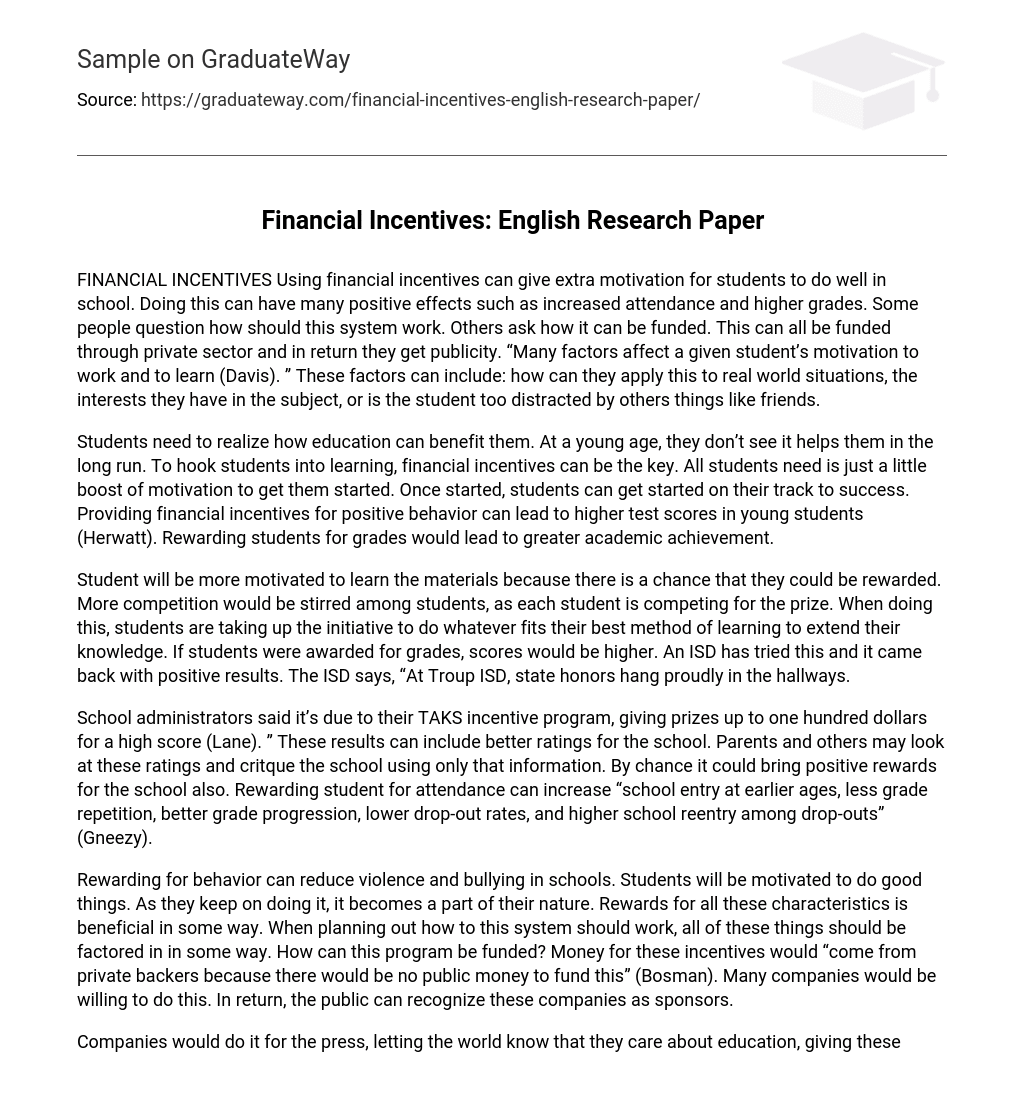FINANCIAL INCENTIVES Using financial incentives can give extra motivation for students to do well in school. Doing this can have many positive effects such as increased attendance and higher grades. Some people question how should this system work. Others ask how it can be funded. This can all be funded through private sector and in return they get publicity. “Many factors affect a given student’s motivation to work and to learn (Davis). ” These factors can include: how can they apply this to real world situations, the interests they have in the subject, or is the student too distracted by others things like friends.
Students need to realize how education can benefit them. At a young age, they don’t see it helps them in the long run. To hook students into learning, financial incentives can be the key. All students need is just a little boost of motivation to get them started. Once started, students can get started on their track to success. Providing financial incentives for positive behavior can lead to higher test scores in young students (Herwatt). Rewarding students for grades would lead to greater academic achievement.
Student will be more motivated to learn the materials because there is a chance that they could be rewarded. More competition would be stirred among students, as each student is competing for the prize. When doing this, students are taking up the initiative to do whatever fits their best method of learning to extend their knowledge. If students were awarded for grades, scores would be higher. An ISD has tried this and it came back with positive results. The ISD says, “At Troup ISD, state honors hang proudly in the hallways.
School administrators said it’s due to their TAKS incentive program, giving prizes up to one hundred dollars for a high score (Lane). ” These results can include better ratings for the school. Parents and others may look at these ratings and critque the school using only that information. By chance it could bring positive rewards for the school also. Rewarding student for attendance can increase “school entry at earlier ages, less grade repetition, better grade progression, lower drop-out rates, and higher school reentry among drop-outs” (Gneezy).
Rewarding for behavior can reduce violence and bullying in schools. Students will be motivated to do good things. As they keep on doing it, it becomes a part of their nature. Rewards for all these characteristics is beneficial in some way. When planning out how to this system should work, all of these things should be factored in in some way. How can this program be funded? Money for these incentives would “come from private backers because there would be no public money to fund this” (Bosman). Many companies would be willing to do this. In return, the public can recognize these companies as sponsors.
Companies would do it for the press, letting the world know that they care about education, giving these companies good reputation. It is important for students to do well in school. In today’s world, having an education is the basis of having a good future. “The fundamental problem with education and motivating kids to learn what they need to learn is that the payoffs are so distant (Bosman)”. Using financial incentives can provide this extra motivation for students to do well. [Bosman] Bosman, Julie. “A Plan To Pay for Top Scores on Some Tests Gains Ground. The New York Times, 9 June 2007. [Davis] Davis, Barbara Gross. Tools for Teaching. San Francisco: Jossey-Bass, 1993. [Gneezy] Gneezy, Uri, Stephan Meier, and Pedro Rey-Biel. “When and Why Incentives (Don’t) Work. ” Journal of Economic Perspectives. 4th ed. Vol. 25. N. p. : American Economic Association, n. d. 191-210. Print. [Herwatt] Herwatt, Stephanie E. “The Harvard Crimson. ” Students Perform Better When Paid. The Harvard Crimson, 13 Apr. 2010. Web. 22 Mar. 2013. [Lane] Lane, Courtney. “TAKS Returns and Incentives Rewarded to Students Who Score High. ” KLTV, 19 Feb. 2008.





